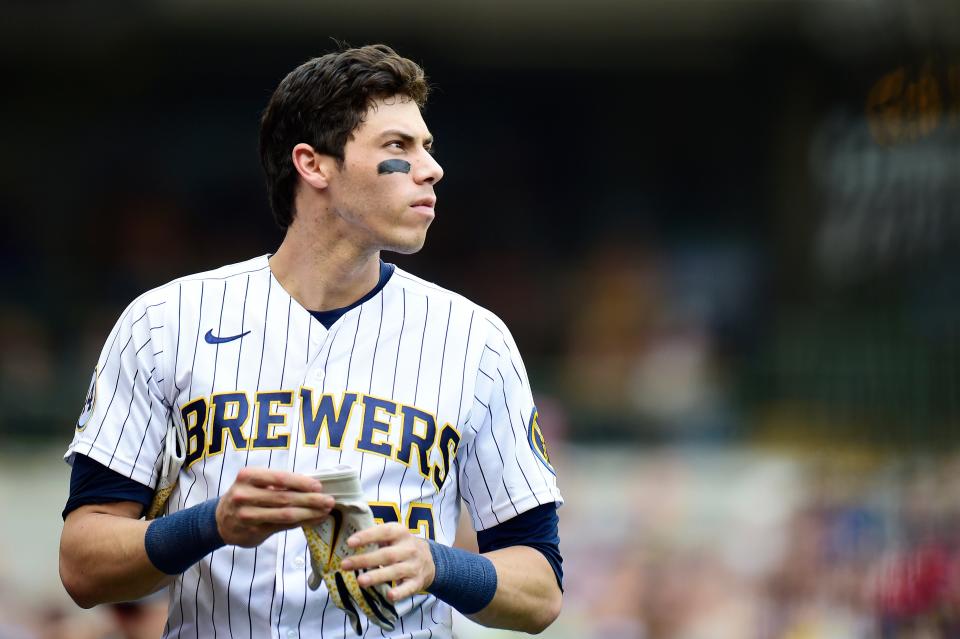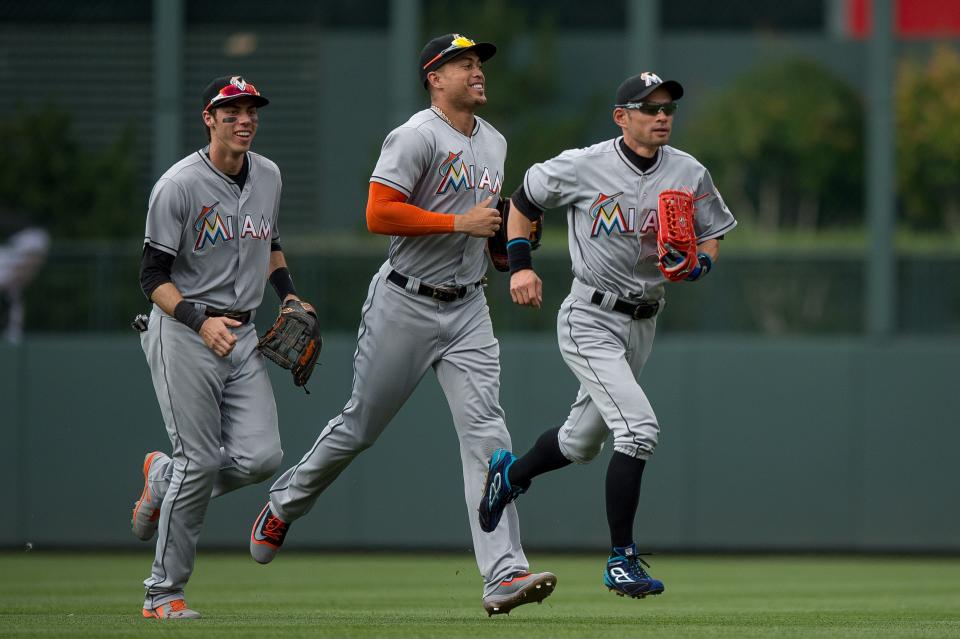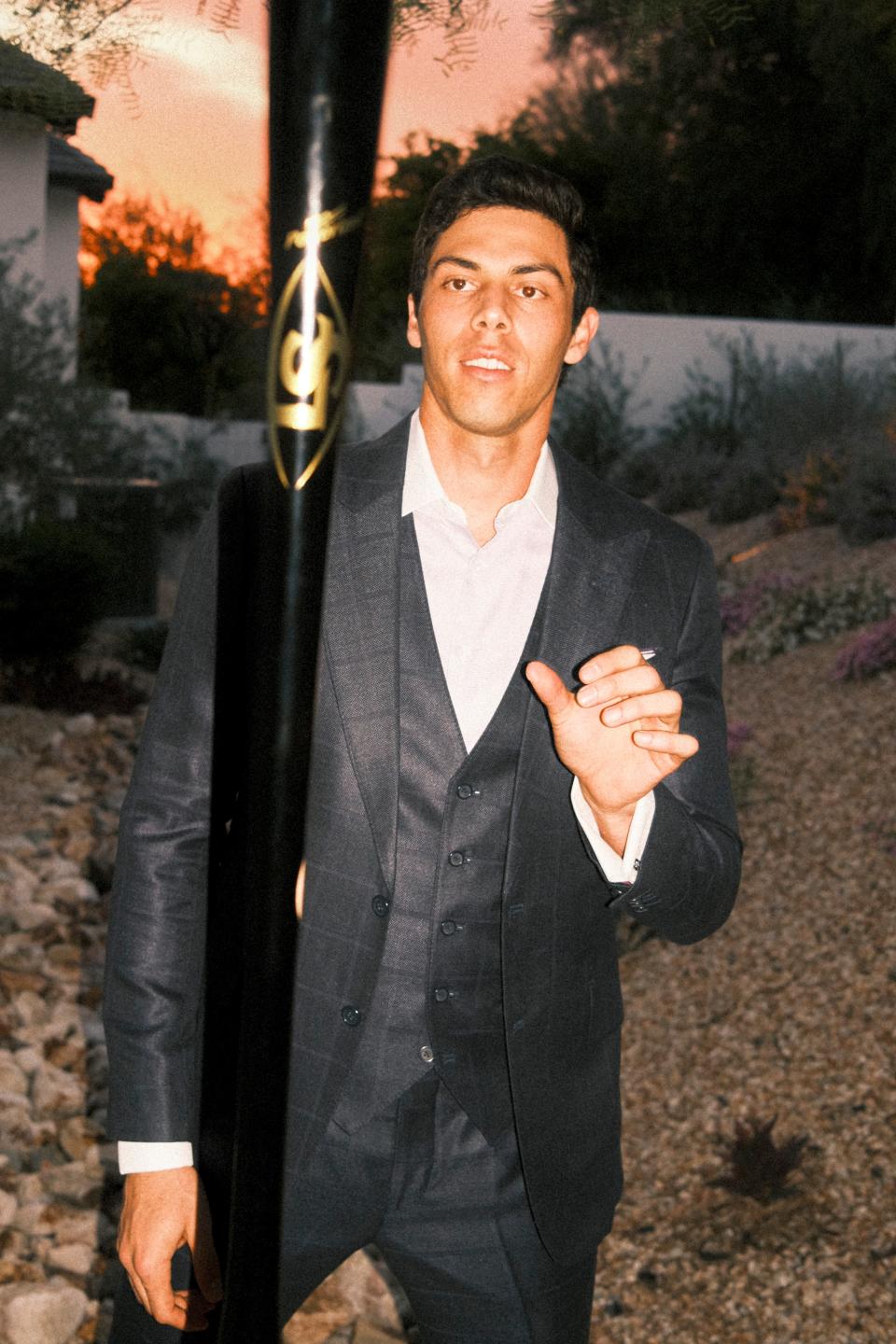“I Don’t Think You Can Keep Chasing the Dragon”: Christian Yelich on Becoming a Vet, Playing With Ichiro, and Baseball’s Supposed Juiced Ball Era

Photographs: Getty Images; Collage: Gabe Conte
It’s late March in New York, and today the Milwaukee Brewers are supposed to open their season against the Mets. But the city’s battered by rain, so the Brewers are instead cooped up in their midtown Manhattan hotel, rained out and shut in. Christian Yelich, the former MVP and longtime face of the Brewers’ franchise, has no problem with waiting. This is his 12th season in the big leagues, and Mother Nature isn’t the only obstacle he’s faced along the way. Chilling for an extra 24 hours is a little easier for Yelich than it is for some of his less-seasoned, extra eager teammates. “Especially Chourio, who was a teenager two weeks ago,” Yelich laughs, referring to Jackson Chourio, the 20-year-old phenom he now shares the outfield with.
At 32 years young, Yelich is now the oldest position player on the Brewers’ roster. “Which is really crazy because I don't feel like one of the older guys,” he says. “I guess I still feel like I mix it up pretty well with the young guys. They're all really talented players, but very, very, very young,” he adds, each very communicating respect for his teammates born in the 2000s while also emphasizing surprise at his newfound veteran status.
If Yelich comes off as younger than his years, it’s in part because he is, in so many ways, built from the classic Southern California ballplayer mold. Growing up in Thousand Oaks turned his laidback levels up to a million, and as we chat in one of the hotel’s spacious conference rooms, his voice rarely goes up or down, mirroring the calm he exudes in the batter’s box. He wears a plain-colored hoodie and a pair of understated Nikes (stealth wealth, but make it baseball), and nurses a cup of coffee from the team’s breakfast spread. He’s got the tall and wiry build typical of long-ago ballplayers, but his clean-shaven, angular face has drawn comparisons to Pete Davidson for nearly a decade now. “Every night somebody will scream it from the stands,” he says. “Or somebody will come up on the street and they think it's the first time I've ever heard it. Thanks, man.” (For what it’s worth, I’ve always thought he looks more like a less debaucherous, more athletic member of The Strokes, one who swung a baseball bat rather than a guitar.)
At this stage of his career—and his life—Yelich occupies a space fairly unique to athletes. He’s the oldest hitter on the team, but he’s not old at all in real life. He’s still really good, but he’s not quite at the level that won him an MVP. He’s closer to the end of his playing days than he is the beginning, but whenever that ending comes—and it may not come for a while—he’ll still have a whole life to lead. That’s part of the reason why, he tells me, he’s embraced social media more than most of his quiet (some would say boring) MLB contemporaries. His willingness to put himself out there comes from knowing that time spent as a professional baseball player is very finite, and thinking “it is cool to document some of this stuff.” This is partially why he enlisted the help of Tom Brady’s crack social media team to give his Instagram some of the same flavor. Cribbing young and modern ideas from an older, lionized figure is kind of perfectly symbolic: thanks to fortuitous timing, Yelich can be seen as a bridge between different eras of baseball, and the way our feelings and opinions about the game have changed over time.

San Francisco Giants v Milwaukee Brewers
Yelich was a 2010 first-round pick by the Florida Marlins, before the Miami rebrand, and debuted as a 21-year-old in 2013. Some teammates from his first two years with the Marlins—we’re talking dudes like Juan Pierre, Plácido Polanco, and Rafael Furcal—are straight out of the Remember Some Guys catalog. He’s played with Ichiro (born in 1973), and now with Chourio (born in 2004, the same week Agent Cody Banks 2 came out). Apart from winning it all, he’s seen mostly everything the game can throw at a guy, literally and figuratively. “I've been on teams where we haven't been good,” he says. “I've been on teams where the general manager became the actual manager. I've been on teams where, unfortunately, a teammate passed away in the middle of the season. I've been traded, been on playoff teams. I've had good years, I've had years that were tougher. I think the longer that you play, you kind of get to experience all this stuff and you draw from all those experiences. Hey, I know shit seems good or I know shit seems bad right now, but just stay the course. Who knows what it's going to look like in September?”
It is obvious that the tumult he’s referring to here is the end of his run with the Marlins. There wasn’t a lot of winning in those years, or during any part of his tenure with the Fish, for that matter, even though Yelich was slowly turning into one of the best young players in the league, and played with young stars like the late José Fernández, Giancarlo Stanton, J.T. Realmuto, and Nathan Eovaldi. Tragedy struck in 2016 when Fernández, just 24, died in a boating accident during the season. In many ways, that era of Marlins’ baseball died with him. The team traded Yelich and the rest of the young core in the following years, leaving them with very little to show for a period that began with so much promise.
Even amid a concerted youth movement, Yelich spent time with a couple of GOATs. Barry Bonds was briefly the team’s hitting coach, which came with its own challenges. What works for the greatest hitter of all time doesn’t exactly work for everyone. “Picking his brain helped me tremendously,” Yelich shares. “But there were definitely some times where it was like, ‘Yes, I get it. But also, you're Barry Bonds.’” And Yelich says the most nervous he’s ever been was when the Marlins were in Colorado, where his then-teammate Ichiro recorded his 3,000th hit. Yelich estimates 150 members of the Japanese media had been following them around for weeks, waiting for their compatriot to reach the historic milestone. “He finally gets it, we go out to the field, and we're playing catch in between innings. I remember being like, ‘Don't fucking throw this ball over his head right now. Just don't fuck it up.’ Thankfully I didn't do that, which was cool.”

Miami Marlins v Colorado Rockies
Along with being a bridge to a litany of revered retired guys, Yelich is also a bridge from one style of baseball to another. In the late 2010s, he became one of the poster children for an analytical trend that had taken the game by storm. Call it the launch angle revolution, “elevate and celebrate”, whatever—just know the basic tenets are that if you hit the ball in the air you will do much more damage.
During the 2018 season, his first with the Brew Crew, Yelich went from a nice foundational piece to a bona fide superstar. There, and somewhat remarkably, he overhauled his entire offensive approach on the fly, turning from a ground ball machine—in fact, when he was a Marlin, literally nobody in the league hit the ball on the ground more often than him—to one of the league’s most feared power threats. His batting average shot up, and so did his power numbers: he finished the 2018 campaign with 36 home runs, 15 more than his career high.
Yelich says it all began with an opposite-field dinger he smacked in the 2018 All-Star Game. “I came back in the second half and started messing around with some stuff in the cage, just honestly getting loose that day. I told our hitting coach, ‘Hey, don't freak out. I'm just messing around for these 15 swings. I wonder what will happen.’” Something…happened. “It was like, Oh, wow. This really feels good. I'm going to keep doing it. What do I have to lose? I might as well fuck around with this and see what happens. I got really locked in and kept tinkering with it throughout that year and into the offseason. It was something really little and it just kind of became what it became. And it all started on that first day back from the All-Star break!”
That change—along with the success it brought—helped Yelich become an almost divine figure in Wisconsin. When Yelich was traded there in January 2018, the Brewers had fallen on hard times, missing the playoffs for six years straight. The new guy’s impact was immediate, and sustained. That year he led the team to the brink of the World Series, and the Brewers returned to the postseason each of the next three years as well, giving Milwaukee its best four-year run in the team’s entire history. That made Yelich one of the golden boys of the upper Midwest—a title not without its perks. “It’s a great sports town. Summer in Milwaukee is pretty cool!” he insists. “People tailgate the games! It's really cool to be a part of. I wasn't very familiar [with Milwaukee] until I got traded there.”
One place that ride has taken him is to a new tax bracket. Every professional athlete these days does well at the bank, to be clear, but very few have ever signed a contract like the one Yelich did in 2020. On March 6 of that fateful year, the Brewers inked Yelich to a nine-year, $215 million contract extension. Just a handful of days later, the world shut down, leaving the newly mega-rich outfielder in a bit of an odd place. “I think that's your goal forever,” he says of getting the nine-figure bag. “But how many guys does that ever really happen to? Signing a big deal is so rare, and then to finally have that in front of you, for me, was a surreal experience. It was just such a cool moment, and then a week later you're like, ‘What the fuck happened? We're going home?’”
When the abbreviated 2020 season finally got off the ground, Yelich struggled for the first time. He went from hitting .327 over the previous two seasons all the way down to an unrecognizable .205 in 2020. And even when things returned to normal in 2021, he experienced back troubles that kept him off the field for a chunk of the season and zapped his power. 2022 brought more regression, as he led the league in ground ball percentage again and finished with just 14 home runs, causing some to say that his home run barrage had been a fluke. It wasn’t until 2023 that he started to straighten out again. But his statistical decline also coincided with growing rumors—and eventually revelations—that MLB had been using a different, seemingly rocket-fueled ball during his heyday. Yelich detractors now had scientific evidence that his best power year was the result of playing the game on a slightly easier mode. When I ask if being labeled a juiced-ball benefactor bothers him, though, he is California chill about it all.

“Yeah, but people are always going to have an opinion on everything, and everybody was playing with the same stuff!” he offers. “If they’re saying ‘19 was the juiced ball year, if you look back on a lot of those home runs, I think I only had a couple where I'm like, I don't know if that should have been a homer. There's maybe three or four where I'm like, ‘Ehhh.’”
After five years in the baseball wilderness, the greatest Pirate since Barry Bonds explains how he wound up back in Pittsburgh—and why returning means so much to him.
Despite a recent back injury, his 2024 is off to a roaring start, too, the type to invite the We’re so back conversations. But whether or not he ever gets back to the Christian Yelich of old, I get the sense that he’s at peace no matter what. I ask if he ever compares himself to…himself, the MVP version, and he explains that that’s not really his thing. “I mean, look, they were great years and it was great experiencing them, but I don't think you can keep chasing the dragon,” he says. “Each year has to be its own thing. How you move, how your body moves, how the game is, it's different than it was six years ago, so you don't want to watch stuff from that year and try to copy it. My whole thing is just to be the best version of you this year, whatever that is.”
Originally Appeared on GQ


